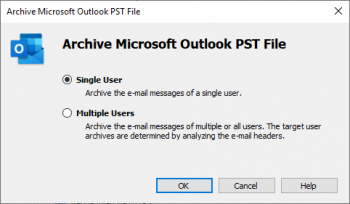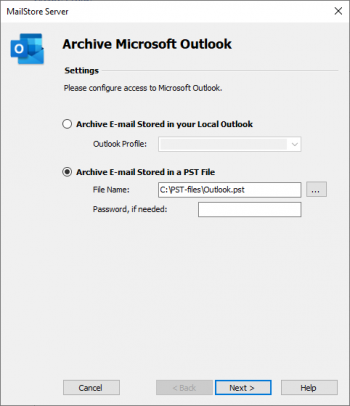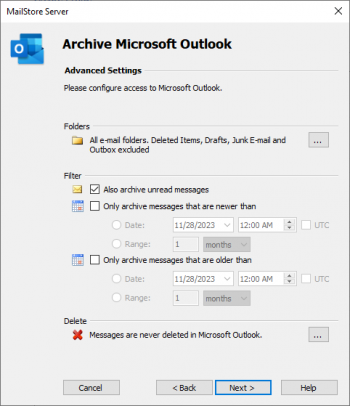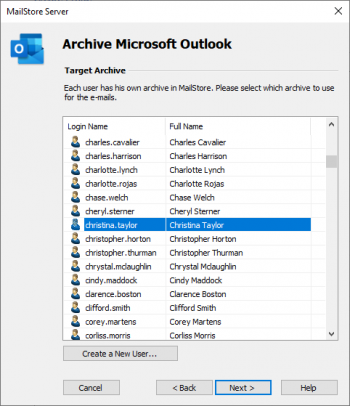Difference between revisions of "Archiving Outlook PST Files Directly"
| [unchecked revision] | [unchecked revision] |
m |
|||
| Line 3: | Line 3: | ||
---- | ---- | ||
| − | With MailStore, PST files can be archived directly. | + | With MailStore Server, PST files can be archived directly. Contrary to archiving emails from Outlook, here you can create and execute archiving tasks independently from users and user computers. The users' individual PST files should be made available centrally, e.g. through a network share. |
| − | <p class="msnote">'''Please note:''' The computer used for archiving PST files through MailStore Client must have a version of Outlook installed that is compatible with the PST files selected. For example, to archive an Outlook 2007 PST file, the corresponding version of Outlook needs to be installed.</p> | + | <p class="msnote">'''Please note:''' The computer used for archiving PST files through the MailStore Client must have a version of Outlook installed that is compatible with the PST files selected. For example, to archive an Outlook 2007 PST file, the corresponding version of Outlook needs to be installed.</p> |
Setting up archiving processes for PST files is done using archiving profiles. General information about archiving profiles is available in the chapter [[Email_Archiving_with_MailStore_Basics#Working_with_Archiving_Profiles|Working with Archiving Profiles]]. | Setting up archiving processes for PST files is done using archiving profiles. General information about archiving profiles is available in the chapter [[Email_Archiving_with_MailStore_Basics#Working_with_Archiving_Profiles|Working with Archiving Profiles]]. | ||
| + | |||
| + | = Archiving a PST file that contains emails of a single user = | ||
| + | |||
| + | <p class="msnote">'''Please note:''' If you don't want to archive PST files in your personal user archive only, you'll have to be logged on to MailStore Client as a MailStore Server administrator. Only a MailStore Server administrator can archive emails for other users.</p> | ||
For each PST file, please proceed as follows: | For each PST file, please proceed as follows: | ||
| − | + | *In MailStore Server, click on ''Archive Email''. | |
| − | * In MailStore, click on ''Archive Email''. | + | *From the ''E-mail Files'' category in the ''Create Profile'' section select ''Microsoft Outlook PST files''. |
| − | * From the '' | + | *A wizard opens, guiding you through the setup process. |
| + | *: [[File:Arch_pst_00.png|center|350px]] | ||
| + | *Select ''Single User'' and click on ''OK''. | ||
*The dialog window ''Archive Microsoft Outlook'' appears. | *The dialog window ''Archive Microsoft Outlook'' appears. | ||
*: [[File:arch_pst_01.png|center|350px]] | *: [[File:arch_pst_01.png|center|350px]] | ||
| − | * | + | *Select ''Archive Email Stored in a PST File'' as source and specify the PST file to be archived. Click on ''Next''. |
| − | * If needed, adjust the | + | ::<p class=msnote>'''Please note:''' If you work with an Outlook/Exchange environment, you get better results by first opening the existing PST file in Outlook and then using the ''Archive Email Stored in your Local Outlook'' option. This way you can ensure that all existing sender and recipient addresses are correctly archived.</p> |
| + | *If needed, adjust the settings for the [[Email_Archiving_with_MailStore_Basics#Archiving_Specific_Folders|List of Folders to be Archived]], the filter and the [[Email_Archiving_with_MailStore_Basics#Archiving_Specific_Folders|Deletion Rules]]. | ||
*: [[File:arch_pst_02.png|center|350px]] | *: [[File:arch_pst_02.png|center|350px]] | ||
| − | * If logged on to MailStore Server as administrator, the target archive can be specified. Select the archive of the user for whom the PST file is to be archived. | + | *If logged on to MailStore Server as a MailStore Server-administrator, the target archive can be specified in the next step of the wizard. Select the archive of the user for whom the selected PST file is to be archived. |
*: [[File:arch_pst_03.png|center|350px]] | *: [[File:arch_pst_03.png|center|350px]] | ||
| − | * | + | *In the final step you can specify a name for the new archiving profile. After clicking on ''Finish'', the archiving profile will be listed under ''Saved Profiles'' and can be run immediately, if desired. |
{{:Includes:Starting the Archiving Process}} | {{:Includes:Starting the Archiving Process}} | ||
[[de:Outlook_PST-Dateien_direkt_archivieren]] | [[de:Outlook_PST-Dateien_direkt_archivieren]] | ||
Revision as of 08:03, 10 October 2013
This article is currently under revision.
With MailStore Server, PST files can be archived directly. Contrary to archiving emails from Outlook, here you can create and execute archiving tasks independently from users and user computers. The users' individual PST files should be made available centrally, e.g. through a network share.
Please note: The computer used for archiving PST files through the MailStore Client must have a version of Outlook installed that is compatible with the PST files selected. For example, to archive an Outlook 2007 PST file, the corresponding version of Outlook needs to be installed.
Setting up archiving processes for PST files is done using archiving profiles. General information about archiving profiles is available in the chapter Working with Archiving Profiles.
Archiving a PST file that contains emails of a single user
Please note: If you don't want to archive PST files in your personal user archive only, you'll have to be logged on to MailStore Client as a MailStore Server administrator. Only a MailStore Server administrator can archive emails for other users.
For each PST file, please proceed as follows:
- In MailStore Server, click on Archive Email.
- From the E-mail Files category in the Create Profile section select Microsoft Outlook PST files.
- A wizard opens, guiding you through the setup process.
- Select Single User and click on OK.
- The dialog window Archive Microsoft Outlook appears.
- Select Archive Email Stored in a PST File as source and specify the PST file to be archived. Click on Next.
Please note: If you work with an Outlook/Exchange environment, you get better results by first opening the existing PST file in Outlook and then using the Archive Email Stored in your Local Outlook option. This way you can ensure that all existing sender and recipient addresses are correctly archived.
- If needed, adjust the settings for the List of Folders to be Archived, the filter and the Deletion Rules.
- If logged on to MailStore Server as a MailStore Server-administrator, the target archive can be specified in the next step of the wizard. Select the archive of the user for whom the selected PST file is to be archived.
- In the final step you can specify a name for the new archiving profile. After clicking on Finish, the archiving profile will be listed under Saved Profiles and can be run immediately, if desired.




